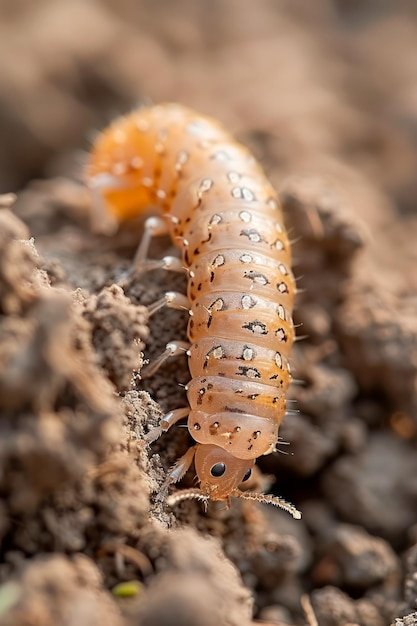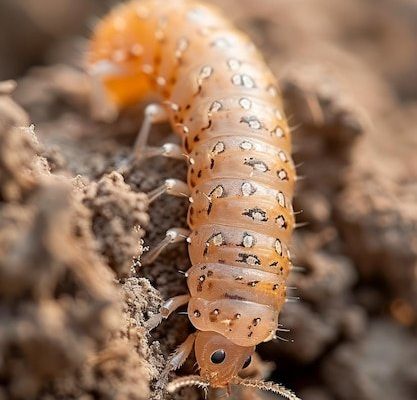
Understanding these natural predators is like discovering the secret recipe to a healthier garden ecosystem. Just like a diverse diet is good for us, a variety of natural pest controllers is essential for your soil. In this article, we’ll explore some of the most effective natural predators of grub worms, helping you appreciate the backyard ecosystem and its many helpful members.
Birds: The Feathered Hunters
When it comes to natural predators, birds are at the top of the food chain. Many species, including robins, blue jays, and sparrows, are particularly fond of grub worms. Imagine a robin hopping across your lawn, its beak probing into the soil, hunting for those tasty larvae. Birds are excellent hunters, and they can consume hundreds of grubs in a single day.
To attract these helpful predators, consider setting up bird feeders and bath stations in your garden. By providing food and water, you’ll encourage birds to frequent your yard, boosting the natural pest control. Plus, their beautiful songs will add a melodic backdrop to your gardening efforts!
The Benefits of Birds in Pest Control
Birds do more than just eat grubs; they also help control other pests like caterpillars and aphids. By creating a bird-friendly environment, you’ll not only help reduce grub worm populations but also create a balanced ecosystem that promotes overall garden health.
Here are some easy ways to attract birds:
- Install birdhouses and nesting boxes.
- Keep birdbaths filled with fresh water.
- Plant native flora to provide natural food sources.
Ground Beetles: Nature’s Miniature Warriors
Next up are ground beetles, small yet fierce predators that are often overlooked. They’re the ninjas of the garden, lurking in the soil during the day and becoming active at night. Ground beetles are voracious eaters and will feast not only on grub worms but also on other harmful pests.
There are over 2,500 species of ground beetles in North America alone, and many of them are effective at controlling pest populations. If you spot these little black or brown beetles scurrying about after dusk, consider it a sign that your garden is on the right track!
How Ground Beetles Help Your Garden
Ground beetles do a remarkable job of maintaining balance in the soil. They don’t just munch on grubs; they also eat other pests and their eggs. By promoting a healthy ground beetle population, you’re investing in a natural pest control system.
You can encourage ground beetles by:
- Adding mulch to your garden beds, which offers shelter and breeding grounds.
- Minimizing pesticide use that could harm these beneficial insects.
- Planting diverse flowers and plants to provide habitat.
Nematodes: The Soil-Dwelling Allies
Nematodes are microscopic roundworms that may not look like much, but they are incredibly effective in controlling grub worms. When nematodes enter the soil, they seek out grub larvae and infiltrate them, releasing bacteria that kill the grubs. It’s like sending in tiny soldiers to do the dirty work!
These beneficial nematodes can control grub populations without harming your plants. Best of all, they don’t require much maintenance compared to other pest control methods. Just be sure to apply them during the cooler months when soil temperatures are appropriate for nematodes to thrive.
Using Nematodes in Your Garden
Applying nematodes can be as simple as mixing them with water and spraying them in your garden. They’ll work their magic underground, helping to break the lifecycle of grub worms. Just ensure the soil stays moist for optimal results.
To ensure nematodes thrive, consider these tips:
- Apply nematodes when soil temperatures are between 55°F and 85°F.
- Water the soil well before and after application.
- Avoid using chemical pesticides that might kill the nematodes.
Parasitic Wasps: The Stealthy Assassins
If you think of nature as a grand stage, parasitic wasps play the role of stealthy assassins. These tiny insects lay their eggs inside or on the bodies of grub worms. Once the wasp larvae hatch, they consume the grubs from the inside out. It sounds intense, but it’s just nature doing its thing!
There are various species of parasitic wasps, and they are extremely effective at controlling grub populations. You might not see them often, but rest assured, they’re working hard behind the scenes.
Encouraging Parasitic Wasps in Your Garden
To attract parasitic wasps, create a welcoming environment. They are drawn to certain flowering plants that provide nectar and pollen. Consider planting flowers like yarrow, dill, or fennel to invite these beneficial wasps to your space.
Here’s how to support them:
- Plant a variety of flowers that bloom at different times.
- Avoid pesticides that may harm beneficial insects.
- Include native plants that provide food and habitat.
Frogs and Toads: Nature’s Pest Control Team
Frogs and toads might not be the first thing that comes to mind when you think about pest control, but they play a significant role. These amphibians love to feast on various insects, including grub worms. Having a few frogs hopping around your yard can help keep your garden healthy and thriving.
Toads, in particular, are great at controlling pest populations because they hunt at night and can consume large numbers of grubs and beetles. Plus, they can be quite charming, adding a bit of life to your garden!
Creating a Toad-Friendly Habitat
To attract frogs and toads, create a space that meets their needs. A small pond or water feature can provide the perfect habitat for these helpful animals. Adding rocks, logs, or other natural materials can also offer shelter and breeding spots.
Consider these tips to make your garden toad-friendly:
- Create a water source that’s small and shallow.
- Use native plants to provide food and shelter.
- Avoid using harmful pesticides that could endanger them.
Beneficial Insects: The Unsung Heroes
Lastly, there are many other beneficial insects that help control grub worms indirectly. Ladybugs, for example, might not eat grubs, but they do keep other pests in check, leading to a healthier garden overall. By fostering a diverse ecosystem, you’re allowing these unsung heroes to thrive!
You might be surprised to discover just how interconnected everything is in your garden. When one pest is kept in check, it leads to reduced pressure on other plants, creating a harmonious environment.
How to Promote Beneficial Insects
Encouraging beneficial insects is all about creating a diverse and balanced garden. Here’s how to do it:
- Plant a mix of flowers, herbs, and vegetables to attract various insects.
- Avoid monocultures, as they can lead to pest explosions.
- Keep your garden free of chemical pesticides and herbicides.
In summary, understanding the top natural predators of grub worms in the soil can significantly improve your gardening efforts. By inviting birds, ground beetles, nematodes, parasitic wasps, frogs, and other beneficial insects into your yard, you create a thriving ecosystem that benefits everyone. So, next time you’re in the garden, take a moment to appreciate these little champions that work tirelessly to keep your plants healthy and happy!

